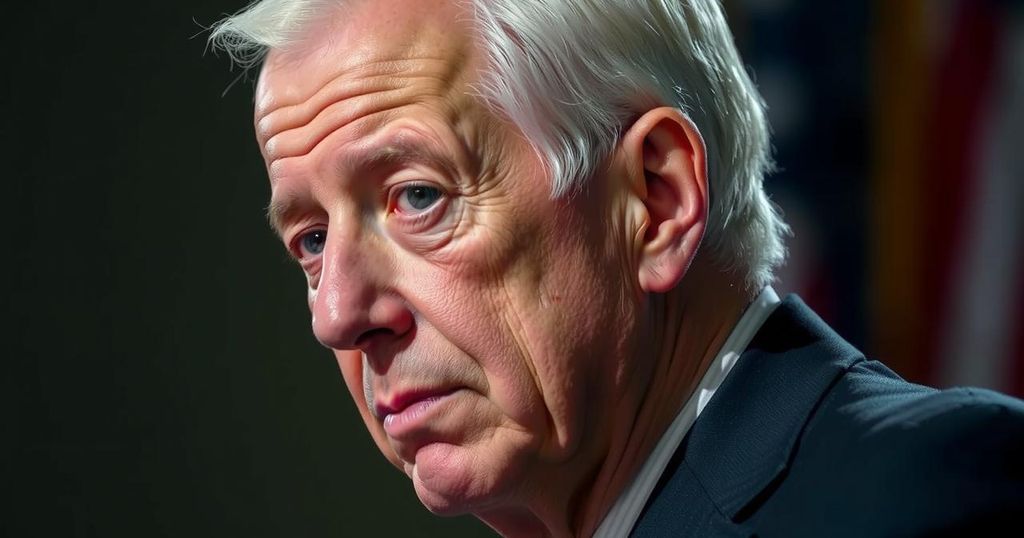Politics
AIR FORCE ONE, AMERICA, AP, BIDEN, BRAZIL, DAVID AXELROD, DEMOCRATIC PARTY, DEMOCRATS, DONALD TRUMP, ELECTION, G20 SUMMIT, JOE BIDEN, JOINT BASE ANDREWS, MANAUS, MANUEL BALCE CENETA, MUSEU DA AMAZONIA, NORTH AMERICA, OBAMA - BIDEN WHITE HOUSE, PRESIDENTIAL RACE, REELECTION CAMPAIGN, RIO DE JANEIRO, ROSE GARDEN, SOUTH AMERICA, U. S, U.S. PRESIDENCY, UNITED STATES, US ELECTIONS, WASHINGTON
Fatima Khan
0 Comments
Biden’s Silence Post-2024 Election: An Analysis of Leadership and Legacy
Following the Democrats’ defeat in the 2024 elections, President Biden has adopted an unusual silence, limiting his public engagement and refraining from discussing the election’s implications. His brief comments in the Rose Garden have not been followed by substantive reflections, leaving many to speculate about his approach to leadership in the wake of significant political changes. As Trump prepares for a second term, Biden’s silence poses questions about his influence on the future direction of the country.
Since the Democratic Party’s disappointing electoral performance in 2024, President Joe Biden has notably refrained from making public statements regarding the outcome. Following a brief six-minute speech in the Rose Garden, where he called for unity among Americans, Biden has largely remained silent, including during a recent six-day trip to South America. His lack of communication is significant at a time when many are seeking clarity on America’s future and the implications of a Trump administration. Analysts have suggested that Biden’s silence may reflect a need for reflection and strategy, as he risks maintaining irrelevance as he approaches the end of his presidency.
Biden’s aides have indicated that the President is thoughtfully processing the implications of the recent election, emphasizing the importance of a gradual and respectful transition of power. They have also cited his adherence to electoral traditions, contrasting his behavior with Trump’s previous attempts to undermine election integrity. Amidst this backdrop, Biden’s absence from public discourse is particularly striking, especially given the election’s implications for American democracy.
During his meetings with world leaders in South America, Biden did not hold news conferences—a common practice for American Presidents. Instead, he allowed other global leaders to address critical foreign policy decisions. Such actions indicate a strategic retreat from the spotlight, which some commentators believe could hinder his legacy as he remains comparatively quiet on pressing issues, such as the conflict in Ukraine and the ramifications of the election results.
As the global community progresses with or without Biden’s input, many are left questioning the political direction of the United States and the potential impacts of Trump’s second term on both domestic and international fronts. Biden’s expected role as a guiding figure seems diminished, raising concerns about his legacy should he remain reticent in the face of significant global challenges.
President Joe Biden’s relatively subdued response to the Democratic losses in the 2024 elections raises numerous questions about his leadership approach during this critical juncture. Historically, a president’s engagement with the public and media following an electoral loss can significantly influence their political legacy and the perception of their administration. The political landscape has dramatically shifted with Trump’s win, leading to an urgent need for candid dialogue and proactive leadership. In this context, Biden’s silence could inadvertently create a void, diminishing his ability to shape the narrative surrounding his presidency and its implications for the future of democracy in America.
In conclusion, President Biden’s decision to remain silent following the recent electoral defeat reflects a complex interplay of strategy and introspection. His quiet approach risks leaving a vacuum at a crucial time, as the nation navigates its political future under Trump’s leadership. While Biden’s aides stress the importance of tradition and transition, the president must also engage meaningfully with the public and media to assert his influence and safeguard his legacy during the final months of his term.
Original Source: apnews.com




Post Comment